#screw patriarchy
Explore tagged Tumblr posts
Note
I want to know more about Top Hat past before she became a member of the Star Fleet
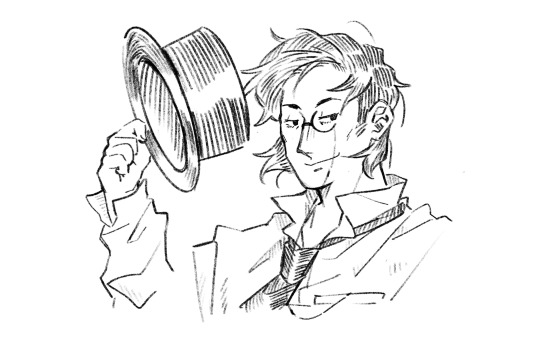
alright it’s time to strap in because this is gonna be lengthy and heavy at certain points
cw: japanese colonialism, mentions of misogyny and toxic masculinity, internalized transphobia
hwang dong-ha hailed from keijō, which will eventually become seoul after korea gained its independence. at that time, korea was under the japanese colonial rule, and mass industrialization progressed at a rapid speed. dong-ha’s father worked as a laborer at a railroad construction site, and despite the hardships the family faced, dong-ha lived an uneventful childhood. that’s just how things are with other families, she thought. dong-ha had little interest in playing with other children and prefers accompanying her mother at home.
as the iron grip the japanese empire had on korea tightened, the hwang family’s living condition didn’t seem to get any better. in 1921, the hwang family moved to the states, looking for better job opportunities. at least dong-ha still has her parents.
after dong-ha’s father’s contract as a plantation worker in hawaii expired, the hwang family decided to open their own business in san francisco, utilizing mrs. hwang’s specialty in sewing. a small tailor shop/boutique that specializes in western coats and suits, squeezed between a tight row of stores. things were going slow with the culture difference and all, but business picked up at a steady pace after the hwang family met other korean immigrants in the neighborhood.
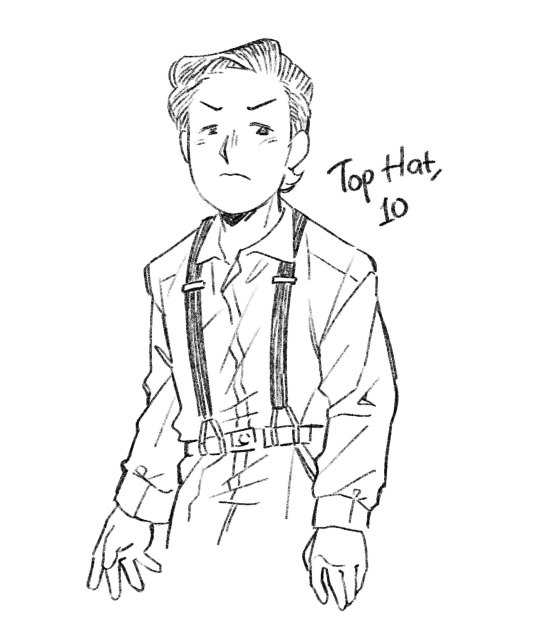
due to her upbringing, young dong-ha held onto rather conservative beliefs regarding success. her father is stubborn about the way things have to be done and that rubs off on her. look, dong-ha. look at what we have now! see? if you work hard, you’ll make it in life. you’ll always be rewarded. you wouldn’t have imagined this kind of life when you were a kid!
those questionable words of encouragement didn’t permanently work on dong-ha, though. as she grew older, dong-ha questions more of her world – what will she be doing in the future? will life always be like this? where does her agency start and end? will her world only consist of her, mother, and father? and like every single teenager out there, dong-ha rebels.
the hwang parents noticed dong-ha sudden interest in how she presents herself. if she wasn’t taking enough interest in fashion already, she’s now dressed to the nines in glossy suits and thick coats (conveniently conceals her figure, definitely not some foreshadowing) and acting like some sort of elite socialite, much to her parents’... worry. dong-ha had always been obedient, but attempts at suppressing her just resulted in her pushing her parents away more. she was just having fun with self presentation, being raised during grueling times, and her parents were being annoying about it? fine. she’ll seek her own people.
dong-ha’s companions throughout her young adult years were sons from upper class backgrounds. although her family is not wealthy, dong-ha was friendly and said yes to everything. being invited to cabarets and bars for pool games has now become a regular occurrence to her. she even acquired her liking towards wine from these outings. she will be normal. she WILL fit and everyone WILL like her and her clothes. and her personality – speaking of which, dong-ha becomes more arrogant and self-absorbed as she spends more time with these people. she often lied when asked about her personal life, losing more of her humility. and after a particular incident that got mrs. hwang dragging dong-ha back home in front of her friends, her relationship with her parents deteriorated.
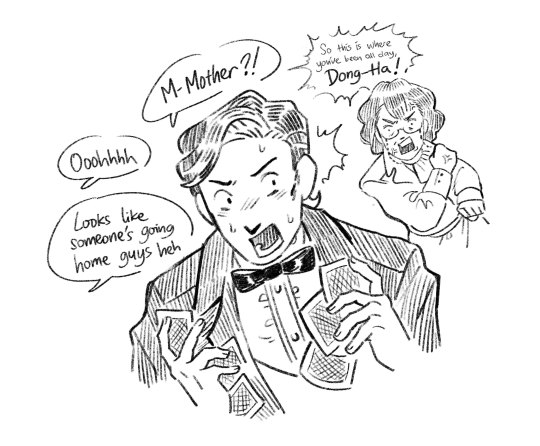
as time passed, dong-ha grew increasingly wary of the subjects her “friends” discussed. how their parents become rich not out of hard work, or how the working class aren’t working hard enough, or the way they talk about women, or the way they view marriage as something transactional, or children… it’s all disturbing to dong-ha. but she doesn’t have any other friends. these men were her only companions besides her parents, and she had to stick with them. that’s how men are supposed to be. this is what she had to do.
this poses another problem – dong-ha was supposed to be a proper “man”. not to mention that she’s the only “son” that her parents have. is this what it means to be a man, then? be crass and rude to assert their dominance? flaunt their physique? fall for women and have them for himself? dong-ha is disgusted, but they aren’t… as if it’s something natural. it doesn’t make sense, and when people can’t make sense of something, they get angry. a man is supposed to be masculine, dress the part, control those below him, woo a woman, then marry her. that’s how things are supposed to be, damnit. but she doesn’t like any of this. dong-ha felt like an outlier.
dong-ha admires women not in a way that’s supposed to fit how a man is expected to: not in an attraction, borderline domineering way, but as if they’re something… graceful. nigh unattainable. they’re resilient and beautiful. they’re beautiful not because she wants them for herself, but because they just are. she was disinterested in the idea of masculinity before, only performing it because that’s what is expected of her, and now she’s wholly appalled by it. looking back, she preferred the days when she was younger and helped her mother with sewing rather than mingling with loud, callous, and misogynistic men.
dong-ha’s friends noticed how dong-ha became less talkative, only drinking with a condescending glare directed at them. she averts her gaze when they were talking about annoying maids or girls, and the streisand effect gets into work. they’d poke fun at dong-ha and joke about how she probably had a bad night; “do you not like women? did a girl reject you or something? you’re being so weird, dong-ha.” and she still had to put on a facade. “they’re so annoying. but what if they aren’t, and the one who’s wrong is actually me? utter nonsense, dong-ha. have some self respect.”
so comes the turning point. after a late night out drinking her frustrations away, she came back home to think about reconciling with her parents and retreat back to her small world – consisting of just her, mother, and father. though she constantly goes back and forth between thinking she’s in the right and feeling guilt towards her parents, the latter of the two consciences won. she found mother and father in the living room that night, and a verbal fight quickly broke out. despite her attempts at apologizing, mother and father kept scolding dong-ha, and in reflex she came to her own defense. dong-ha’s father ended up making hurtful remarks about how she’s an ungrateful son who never appreciates what they have, instead distancing herself from her family to hang out with random wealthy strangers, and how he hated the way she always flaunts herself and other nitpicky things and that clearly cuts deep. because she has never seen her father this mad before. and her mother just stares at her, unmoving. not only is the world outside confusing, now her own world has been tainted.
she is furious. and prideful. and stubborn. wait, she is? she’s stubborn? no. it was them! they don’t understand her. nobody ever does. she’s the one who’s unlucky. the world doesn’t give her the answers even though she has asked so many of them. everyone’s just so incompetent! beneath her!
having given up in trying to make sense of the world outside her own, the disillusioned dong-ha moved to bigg city port while only leaving a single letter to her parents. she needed a new scenery to escape this contradicting world. no more family boutique, no more hangouts with the narrow-minded morons she used to call “friends”. she didn’t fit in with them, or anyone, really – is there really a place for her in this world? logically, there should be. dong-ha is prideful and stubborn. she believes she deserves much more than what she’s given as much as she feels sick at herself.
the boundless sea stretching beyond the docks and piers gained dong-ha’s interest. she asked for a job and some guy directed her to a certain captain archibald star. dong-ha landed a job in bigg city port as a helmsman for the star tug & marine. she was assigned the #4 railway tug “top hat”. captain star’s bouts of american patriotism often made top hat raise an eyebrow, but he was a pretty okay guy. as long as she views him as her employer and nothing else. still, she is quite vain, and due to a lot of dockside workers being men, top hat viewed everyone around her as beneath. doesn’t matter if you’re a star, or a zed, or the two idiots (her own words, not mine) from the railhead, there’s a high chance top hat has broken down your character and constructed several lists of thesaurus-sanctioned phrases personalized just for you inside her head.
though… dong-ha’s coworkers were far, FAR better than her “friends” from her youth. they actually have something meaningful to discuss during breaks besides objectifying women and money and other weird things. hercules is nice and pleasant to talk to, not to mention his open mindedness that earned top hat’s liking. warrior and big mac often gave her headaches, but they put up with her bouts of vanity with a wisecrack or two, much to her surprise. OJ was annoying at times, him being the wisest yet kind of old fashioned, but he’s still decent company. eddie and frank… they’re thing 1 and thing 2. (she likes them. nahhhh she doesn’t. that’s just how she is. actually she does like them. she’ll knock herself on the forehead before even smiling at frank and eddie.)
the stars (some of the zeds too, but you know how they are) also didn’t make any weird comments on how she likes to dress extravagantly even during hot weathers, and even if they did, said comments only go as far as mentioning how fitting it is with her character, nothing more. this is all pre-FBC, and she was still referred to with he/him pronouns. though top hat still hadn’t figured out that she’s a woman because she didn’t realize it’s an option for her (due to the morons she used to hang out with), she has thoughts about ditching the concept of being a “man” fully after reminiscing about how she’s often uncomfortable at being referred to as a “man” or anything that points out her lack of interest in anything masculine. her self discovery is further supported given the healthier environment she’s in, and the revelation that she wasn’t the only person who dealt/was dealing with gender issues (there’s hercules who broke the news for her, then she later met lillie, then ten cents, then sunshine, then boomer, then zip (THIS IS A WHOLE NOTHER CAN TO OPEN)) led to her embracing herself as a trans woman. fortezza bigg city is a tough story for the young’uns like ten cents and zip but things are much better on top hat’s side at this point
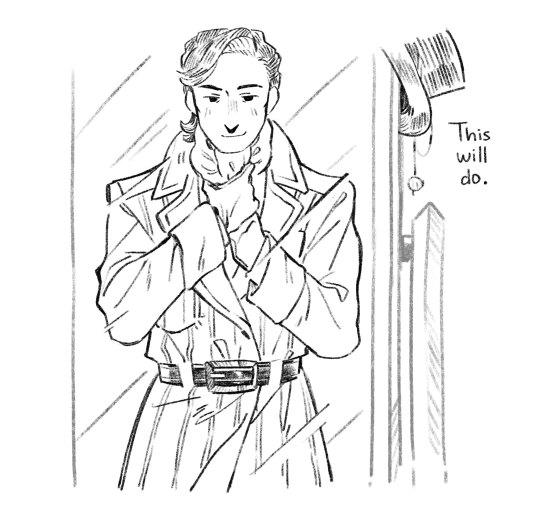
of course, like how everything in this world follows a certain order, this is top hat’s world now. by the events of fortezza bigg city, at the age of 27, top hat is still her usual prideful self, but she’s working on being more compassionate towards people around her (lord stinker says hi). she’s sharp and quick-thinking and is quick to make stinging remarks just for the fun of it, but what’s top hat without a one-liner every five minutes? she’s no longer bitter and withdrawn. top hat’s having fun now <3
#asks#sole-di-fragola#this is tugs#tugs top hat#fortezza bigg city#senjart#her story is fun to write because I'm indonesian (batak specifically) and well. the japanese weren't kind back then!#AND THE GENDER STUFFFFFF AND THE TWO WORLDS STUFFFFFFF AND HOW WE'RE ALMOST THE SAME IN CHARACTER#sometime later she meets zayin and ohohoho that's for another story ;9#I'd like to think she gives off advice about how she views gender to boomer. in her own special top hat brand way of course#screw the patriarchy.... WE'RE BALLING#if I see any of you being weird I'm gonna turn on my red sharingan mystic demon eyes and unleash my powers. big senja is not playing
116 notes
·
View notes
Text
I think I'm starting to realize that my problem with many "feminist" retellings of myth or history or sometimes feminist fiction, in general, is that they are written by authors who while valid in the frustrations, anger, and issues they bring up in their work are lacking in the nuances and complexities of feminist theory. And as such their approach to a feminist retelling/story becomes reductive and overly simplistic. Men are villains and women are victims. But the sad reality of patriarchy that many of these stories fail to grasp is that even good men perpetuate it as an inevitable result of being born and raised in a patriarchal society. We like to think that the venn diagram between loving someone and viewing them as property/less than human is just two separate circles. It's simple. It's easy to understand. It's black and white. You either see the women in your life as whole people and love them or they are possessions to be traded through marriage. But the unfortunate case is that through much of history and ancient myth, there was a great overlap.
And that's where it gets messy. It's the father refusing his daughter to marry for love and instead wed who he chooses because he's thinking about her future (and perhaps his own gains as a benefit). It's the brother making misogynist jokes with his friends but don't you dare talk about his sister like that or consider dating her because that's his relative. And there are many more examples. Men navigate a world in which love and possession have long been entangled to the point it's difficult to see where one ends and the other begins.
And so when I see feminist retellings that reduce everything to the latter, in which none of the twisted nuances are really addressed, I feel it's incomplete. It's too easy. By making the men monsters we make it too easy for men in real life to divorce themselves from the part they play in upholding patriarchy because well, obviously they're not a raging rapist like that guy. Plus it also feels like we're doing an injustice to female readers by reducing it to such a simplistic portrayal because the misogynist is not always that easy to spot at first glance.
Patriarchy is insidious by virtue of how it normalizes the objectification and subjugation of women. They're not limiting the autonomy of the women in their lives, they're just looking out for them because they can't be trusted to make decisions in their best interest. And so, even men who believe they see women as people and certainly love the women in their lives don't see themselves as oppressors but rather protectors. Their version of patriarchy, in their eyes at least, is benevolent.
So while it might feel cathartic to have our female protagonists start kicking ass and taking names, which it most certainly does, I really would like to see the more complex aspects of living in patriarchy explored. The struggle of knowing your father loves and will console you when you cry but doesn't see you as a fully realized person. To live among male family members who genuinely think they know what's best for you (whatever what's best for you even means), even gently explain why it's their job to protect you, even from yourself. And the aching knowledge of knowing that even as they love you, your lot in life is to be a possession, a wife, a mother. The sad reality is that not every misogynist is a mustache-twirling villain for whom you can hold no sympathy and to ignore that is to give them an excuse to say "not me, I'm a good guy".
#feminist writing problems#feminist writing#writer brain rambling#just been thinking a lot lately about how so many feminist retellings of greek myth don't work bc the men are misogynist cartoons#but that's not always how patriarchy works#patriarchy screws men over too by tainting their perception of how to love
18 notes
·
View notes
Text
I'm on the verge of starting the Syndicate irl I swear to God FUCK THIS GOVERNMENT
#im not even in the dream smp fandom#i just thought of this late at night#i need sleep#dream smp#fuck the supreme court#fuck the patriarchy#fuck the government#screw them
2 notes
·
View notes
Text
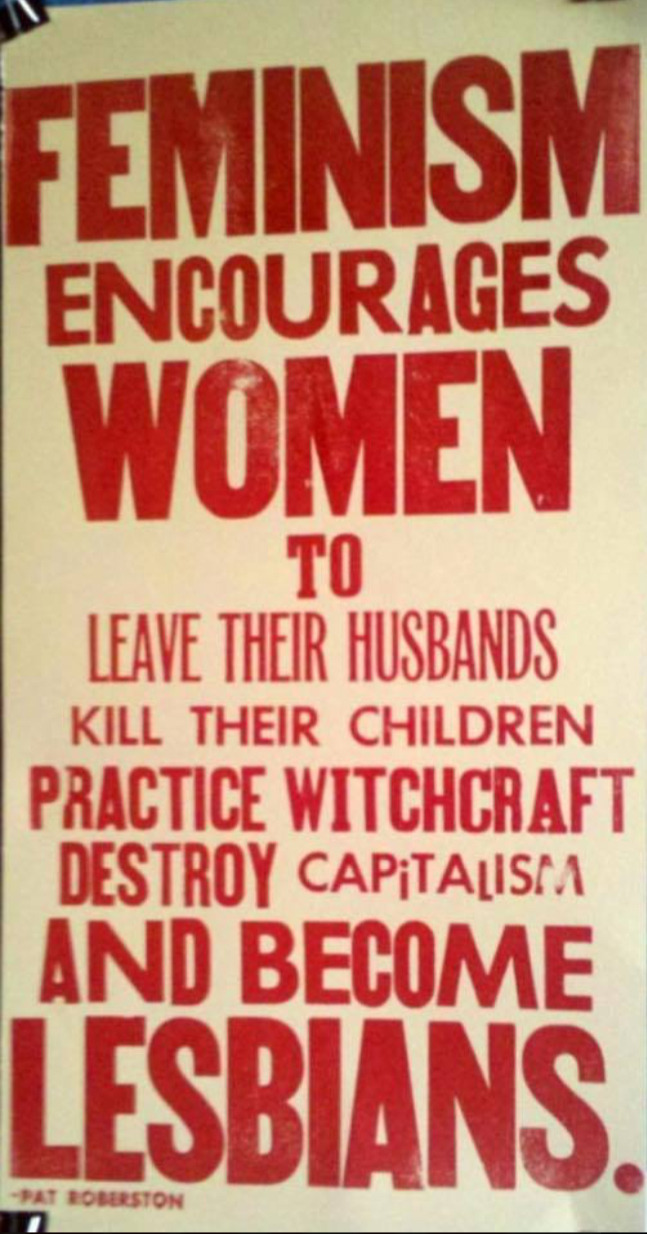
Yayyy
#Lesbian#pride#lesbian pride#LGBTQ+#lgbtq#lgbt#feminism#screw the goddamn patriarchy#Lmao#lol#sorry my life has gone to shit#hahaha help
5 notes
·
View notes
Text
One of the things I hear a lot from Gentile witches and neo-pagans who want to work with Lilith or claim to work with Lilith, is that she is actually a Mesopotamian goddess, usually either Ishtar/Inanna or Erishkigal, and that it was the Jews, with their horrible patriarchy juice, who slandered her and cast her down, and so the Jews do not deserve to say what happens to her and it isn't antisemitism to work with her, or to completely ignore what the Jews say about what she is in a Jewish context.
Lilith is not Ishtar or Erishkigal. However, there is a Mesopotamian figure that is pretty stinking analogous to Lilith, and is probably her folkloric ancestor, by which I mean the idea of Lilith probably comes from this Mesopotamian figure. In fact, Lilith almost certainly is either a Jewish version of this figure, or, they are both descended from the same Near Eastern and Mediterranean basin folkloric figure. That figure is Lamashtu.
Lamashtu is, much like Lilith, the supernatural embodiment of maternal and infant mortality, a figure of power and terror, who functions as a way to embody and cope with the profound dangers that are pregnancy, childbirth, and infancy without effective medical care. the Mesopotamians never worshiped Lamashtu, but they did seek to appease her, including making symbolic gifts to her, to keep her from visiting them, and killing them or their children.
An interesting side note is that there is also a Mesopotamian figure who specifically opposes Lamashtu and functions as the protector of pregnant women and infants, and that figure is Pazuzu, a wind spirit, who ruled over other wind spirits, including ones called the Iilu in the Akkadian language. Akkadian is a Semitic language, related to Hebrew, and this word is probably a cognate of Lilith, but the Iilu probably have no relationship to the figure of Lilith except her name. You might know Pazuzu as the demon featured in the movie, The Exorcist, and ironic fate for a mythological protector of women and children.
Anyway, if you'll remember, I implied above that the Lamashtu/Lilith figure, was present in various guises throughout the Mediterranean basin and the Near East, so there are of course figures analogous to both of them throughout the region, such as Lamia of Greece, and the Strix of Rome.
So if you really really want to work with a figure who functions as the supernatural embodiment of maternal and infant mortality, Lamashtu, Lamia, or the strix would all be excellent options that don't come from an extant closed religious practice. All the baby killing, none of the antisemitism and cultural appropriation.
While all three figures are almost certainly descended from the same folkloric root, they're all subtly different, because as stories and characters travel, they change. as such, they all have particular good points about them as figures of veneration.
Lanashtu is the OG bad bitch, who commanded fear, respect, and offerings, like a mythological mafiosa, collecting protection money.
Lamia has attached to her the story that she was one of Zeus's dubiously willing lovers, who was screwed over first by Zeus, the embodiment of patriarchical rule, then by a jealous Hera, the embodiment of patriarchal marriage, so if what attracted you to Lilith was the story from the Alphabet of Ben Sira, about a victim of the patriarchy getting her own back through violent vengeance, Lamia might be the girl for you. With her however, the emphasis is less on her murder of children, then on her seducing and eating men, though she does also get strongly associated with killing children, especially boys.
And the strix is particularly interesting, because the word comes down to us in the modern Italian word for witch, striga. Indeed, one of the theories as to where the witch figure came from in Early Medieval, and then Early Modern Christianity, was as the strix demon made human. This might explain the close association between Early Modern Witchcraft and infant mortality, including Italian stories of witches causing infants to die seemingly natural deaths, so that they could dig them up and eat them after their funerals, something that ties these human supposed witches very closely to demonic folkloric antecedents. If you are looking for a figure of unfairly maligned female power, the strix and her close association with later human witches, might be the one for you.
All three of these figures, much like Lilith herself, are reflections, both of the power women wielded even within patriarchal societies, over the process of pregnancy, birth, and childrearing, and also the powers of death and loss that everyone was subject to. There is something powerful, transgressive, and even healthy in acknowledging the fears and dangers presented by this death and loss,and for some people, that might take the form in venerating the underlying powers. If this is something that would be spiritually meaning for you, and you wish to work with such a figure, and you are not Jewish, please respect the fact that Lilith is part of a closed religious practice, and remember that Lilith has sisters, in other parts of the Mediterranean basin and the Near East, who are not from extant closed cultures, and who might serve your needs better anyway.
1K notes
·
View notes
Note
sorry to bother you about the "male lesbian" post that said people assume they're always cis... I just want to raise you how many even subconsciously see trans mascs as "escaping" being a woman. how they now have power and privilege, and being a woman was so terrible
they hear "i'm a trans man but consider my attraction to women sapphic" and say "but your entire thing was to not be a woman! you can't do this!"
i've never liked the sentiment that all trans men are "escaping" womanhood. it's so vile. of course some trans men never want anything to do with womanhood and they are absolutely allowed to. but most trans men aren't necessarily transitioning to "escape' womanhood, they're doing it to become a man. those are independent situations from one another. some trans men do feel tortured as women and desperately need to shed that label. some do not
and it does really suck when people just assume trans men instantly gain power and privilege in society just because they came out. most trans men never receive any kinds of social benefits from being men- they are not treated better by medical professionals, they do not receive better wages, they do not receive more hours or benefits at work, they often are fired before they're able to hold any kind of position of power in a company... not to mention how people treat pregnant trans men. even if trans men pass as cis theres always something waiting around the corner to screw them over. a medical professional or cop seeing an F marker on a license could be life or death in a lot of cases. a lot of doctors just don't fucking care about trans men with F markers and will become actively hostile when they see that, or a "feminine" name.
very, very few trans men benefit from patriarchy. it's not an instant thing you magically gain the second you come out or realize you're a man.
and yes it's so ugly to have people respond to a sapphic or lesbian trans man with "i thought you didn't want to be a woman!" or like you said, "escaping" womanhood. people just sort of instantly pull that card instead of taking the time to ask that person what they meant. instead they just make a bunch of assumptions. that's the problem here in general is that people literally make an assumption about what male lesbian means and then refuse to ask the person what they meant by it. it's rude dumbass behavior
114 notes
·
View notes
Text
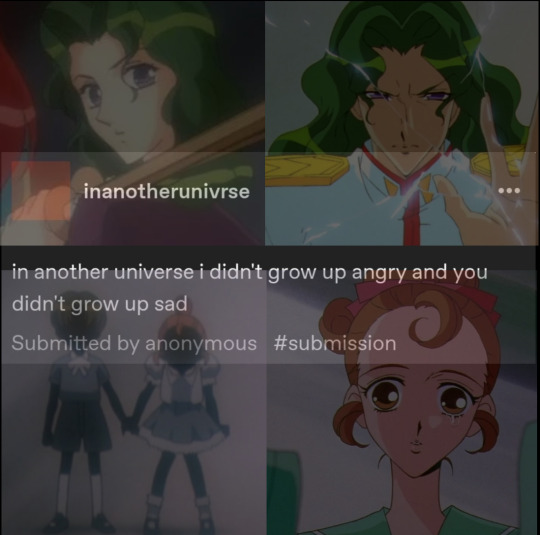
Is this anything (Please tell me you see the vision)
YAP SESSION BELOW THE CUT —>
Saionji is a horrible person and I’m not justifying his actions in any way. But seeing his big innocent eyes and the way him and Touga used to be truly tugged at my heartstrings. I firmly believe he had a good heart, if only the system hadn’t shoved toxic masculinity and the need for male validation down his throat. Even though women are absolutely the most hurt by the patriarchy, it screws men over as well. The system doesn’t help anyone, really.
+ Wakaba annoyed me when I was younger but I’m starting to love her. She was a good friend to Utena and especially mature and perceptive for her age. When she tells Utena that everyone’s normal isn’t her sort of normal and encourages her to duel to get Anthy back, I get a little choked up (as well as when she smiles after Utena slaps her, OH MY GOD). Her Black Rose episode really reminded me that she’s just a teenage girl in love. Saionji wasn’t any good for Wakaba, but Wakaba was good for him. He was callous and cruel for what he did to Wakaba’s letter, but Wakaba let him stay in her dorm anyway. She took care of him, risking being caught, and never asked for anything but his company in return. Saionji was gentler with her than we’ve ever seen him. He was more grateful than we’ve ever seen him. He was more pathetic than we’ve ever seen him. Honestly, he allowed himself to be more vulnerable with Wakaba. Though his heart lay with Anthy, if he hadn’t turned out so toxic and violent and abusive and angry, his soulmate would’ve been Wakaba.
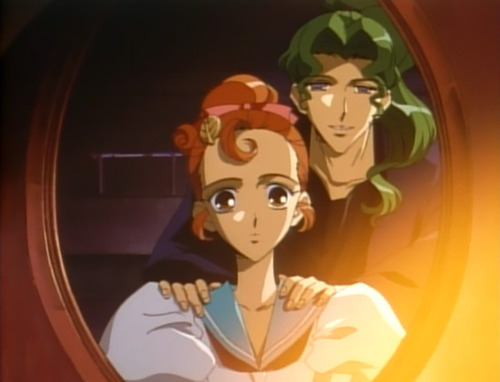
Wakaba is a wonderful girl. Maybe in another universe, Saionji was someone worthy of her. Maybe in another universe, Saionji was a better man.
follow me for more thoughts like this, I’m always crashing out over this niche fandom and even more niche things in the fandom
#tl;dr: i hope everyone gets a happy ending except akio#is this anything#is this too niche#thinking about how saionji in his frilly apron would’ve been such a good malewife for girlboss wakaba#maybe she could be an author and he brings her coffee while she’s working late nights 💔💔#omg I need to make hcs now#fic recs like this PLEASE#revolutionary girl utena#shoujo kakumei utena#rgu#sku#wakaba shinohara#kyouichi saionji#my thoughts#in another universe#late night thoughts#late night post#late night ramblings
38 notes
·
View notes
Text
Personal views on adoption as a pro-adoption radfem (this one's a bit controversial)
I've just run into some radfem posts that voice disagreement with adoption. I have stated my support of adoption, so I figured I should make a post about my actual views in contrast to the views of those who are anti-adoption.
Let me start by saying the system is HEAVILY flawed. Kids are torn from families who do not have the means to meet legal standards for parental care. However... does that mean all adoption is a result of this happening? Let me share a story.
When I was hospitalized for mental distress, I met a young girl who was being adopted. She was 12-13 if I remember correctly. I dont want to say exactly what that poor girl had been through, but she NEEDED this. Her parents were unfit to care for her. In fact, she stated many times that for her age, it was rare to be adopted.
I would consider her adoption a necessary event. There are many other cases of this aswell, and they primarily affect young GIRLS. I knew a little girl who was adopted from China after being abandoned for her sex and a deformity. She got the basic medical care she needed because she was adopted into a family that saw past genetics.
So, while the adoption system can absolutely abuse families in unfortunate circumstances, is this a sign we need to abolish it or a sign we need to fix it?
And if you want to talk about exploitative, would you rather the system that allows unfortunate children the opportunity of family in a culture that already stigmatizes adopted children, or women go through the medical field in terms of fertility treatments and pregnancy?
I was a product of IVF. My disdain for this "treatment" knows no bounds. My conception was shrouded in difficulty. Difficulty that (surprise!) was blamed on the woman, not the man. Blamed on the younger, healthier woman who had already concieved a child rather than the overweight, 31 year old man missing sex organs. The woman was pumped with hormones to force ovulation to the point of ovarian cysts while the man just came in a cup, no questions asked. No hormones were given. No times he had to be on a table, legs spread while a male doctor treated him as a woman's breeder. By the way, those ovarian cysts were also ignored. And how were they fixed? More hormones. The female body to the medical system is like an electronic a male takes into the repair store. Turn her on and off, twist her screws, until she works for him. Even 20 years later, this guy can't even recall what his wife went through in order to have a child with him. The other day, we went past the pharmacy she had to get supplements from... he did not know what she meant by "I used to go there."
Would you rather women go through pregnancy in which they are an afterthought? Would you rather women continue to surrender themselves to the slaughterhouse we call "family planning", especially in a culture that insists on it. Which brings me to my next point.
Culture. If you think adoption has been normalized in our society, you haven't really looked around. The times I've heard infertile people (mostly women) whine and sob about how they can't be parents, and then outright refuse to consider adoption is insane. The amount they ADMIT that they don't think adopted kids are real kids is insane. Again, it's mostly women who argue this. They say that the love of a child they didn't carry isnt the same... as if carrying a child is some fun game. It is a result of the patriarchy enforcing an unrealistic view of female processes. It's almost fetishized. We view the process as a woman's pain for a mans entertainment. That is why it's so essential in our everyday lives. People are OBSESSED with the idea of a woman toiling for a mans comfort. In this case, his comfort is watching her gestate his fetus. That's also why women are told to put on a persona. Walk around with a fetus stealing your nutrients, parade your body around as a mans trophy, and lovingly cast eyes upon your stomach while posing like a fucking show horse. The heterosexual dynamic DEMANDS this. All of this, to me, tells me you shouldn't have kids. If a child needs to stem from your weird patriarchy fetish and obsession with genes, you shouldn't have kids at all. They're more of an asset than anything. I feel like this is the case for most purposeful conception in fact.
Finally, we have the treatment of "birth mothers." To preface, I am absolutely against women having children they WANT taken away from them. However, I think it's again important to look at the socialization of women and how our lack of mentioning men proves my point. Fitting in right with my part on social attitude, we see pregnancy and childbirth as an undeniable swelling of emotions. This is not the case for everyone. The goal of childbirth is to make it out alive, not to be rewarded a screaming red infant. Some parents want their child, and some don't. That is just how it goes, and we see this in the animal kingdom as well. Many social animals will adopt rejected infants and/or eggs. Humans are the ones who make this controversial. In the case of surrogacy and adoption, I always see people complain about the poor, instinct-infested woman. The issue is abusing the wants and needs of women, not daring to threaten the sanctity of new motherhood (another very specific fascination in our collective society). If this was about the emotions of said people, why don't we include the father? It's simple: women are made to feel guilty about adoption and delude themselves into performing an ultimate show of motherly love. Women are taught to romanticize the idea of being pregnant and unconditionally loving a fetus as soon as it's concieved. Men aren't.
Now again, I'm not saying that parents can not love their children at birth, nor am I advocating for children being forcefully taken. I'm more questioning the view of female intention within that love and the trend of singling out a woman. My point does have merit. Why do we act the way we do? Why do we see things the way we see? But every time I call out this type of behavior and question it, I'm treated as if I'm stomping on the pure joy of a tearful mother... whatever, I guess.
Even my mother, who went through IVF to have me with a man who pretends to worship her, said that she did not feel the same love she feels now. She thought she would when she went through treatment, she fell for the trap. We emphasize motherly love in such an inhuman way. It's not a genuine bond. I guess that's why I've always envied men. They stand on the side and seem to love children as a human connected to another human, undefined by unrealistic myths on their brain chemistry. Motherly love to me has to be theatrical and cheesy, based on my pain and suffering, not my human ability to form connection. Fathers get to HAVE children while I AM a mother.
So again, while adoption can be exploitative, you should also consider the other oppressing forces in our current lives. The issue isn't adoption. It's the attitude and people in charge of it. It's the conditioning of women to hurt themselves for giving up a child. Its the women being told lies about a process and viewing it as purely the making of another being, not their welfare. If this isn't an issue for men, maybe consider it's the fact we shove baby dolls in young girls' arms as soon as they themselves are born. Genuinely wanting a child is completely different from being told you should want it your whole life.
#radical feminism#radblr#radical feminist safe#radical feminists do interact#radical feminist community#radical feminst#terfsafe#terfblr#hot take
29 notes
·
View notes
Text
So many people seem to act like men are the scum of the Earth simply because they're men, and then be all :O when they don't want to fight alongside us.
Like idk, if you look at it from a real life perspective - my beautifully nerdy friendship group is predominantly queer, with quite a mix of women and enbies, and also a few cishet men. And you know, we make jokes about them being the token straights and whatnot, but we love them just as much as our other friends - they're very much part of our group.
But if we were having conversations every time we met about how men are the worst, making no distinction between our friends and other men, and didn't bother listening to them when they were struggling with things cos men's problems don't matter as much, and you know, treating them how men often get treated by lefty online spaces, they'd be completely within their rights to go "hang on, I don't think I'm being treated right here, I'm going to find some different friends", you know?
And if every nerdy circle they then find which had a queer/female presence screwed in the same way and was dismissive and cruel about them for being male, then eventually they'd find a group that basically just had guys, probably guys who had had a similar experience, and from there is easy to see why "oh those females hate you? Well, brother, we're all in it together" could lead to them being talked into believing alt-right rhetoric.
And I'm NOT saying it's our fault for the alt-right movement or anything. Obviously hundreds of years of oppression and patriarchy and heteronormativity - and yes, men committing great atrocities against women time and time again - is where that all comes from. Desperate men trying to cling on to their historical power.
What I am saying, though, is that activist spaces should be friendly, welcoming, and radically inclusive: not just to "pander" to men, but because they're human too - many of them wonderful, funny, lovely, incredible humans - who we should actively WANT fighting with us in our spaces.
I saw this post where this man who said he escaped the alt right pipeline said the problem was people on the left "hated him for his immutable traits" or something like that and like. World's smallest violin.
#Idk if that quite makes sense I'm tired#But I'm also so tired of people acting as if all men are the literal devil#And as though any man talking about his feelings doesn't have a right to#You know who also says men shouldn't talk about their feelings?#The patriarchy#It's literally the whole 'just because my pain is bigger doesn't mean yours is less valid' thing#Apart from many little seem to think that a man in pain doesn't have a right to complain because he's not also oppressed#Well quite honestly screw you
274 notes
·
View notes
Text
Intro post!
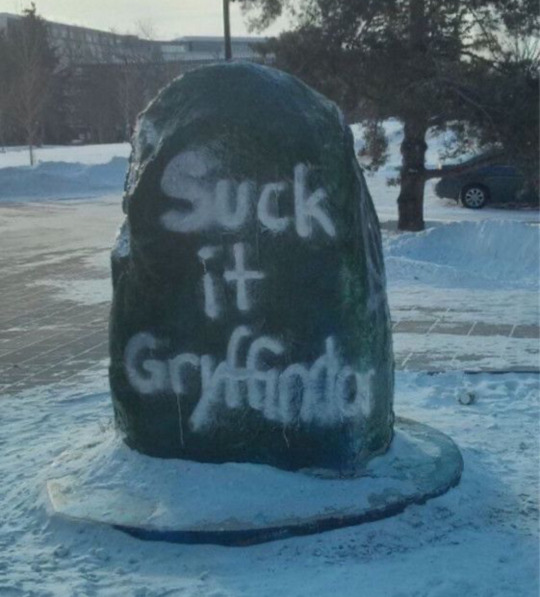
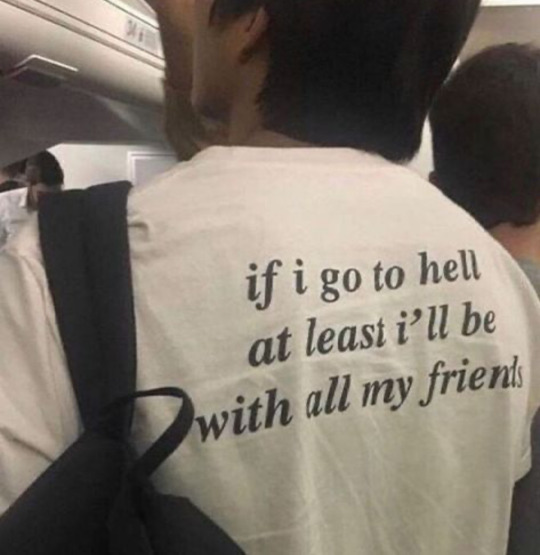
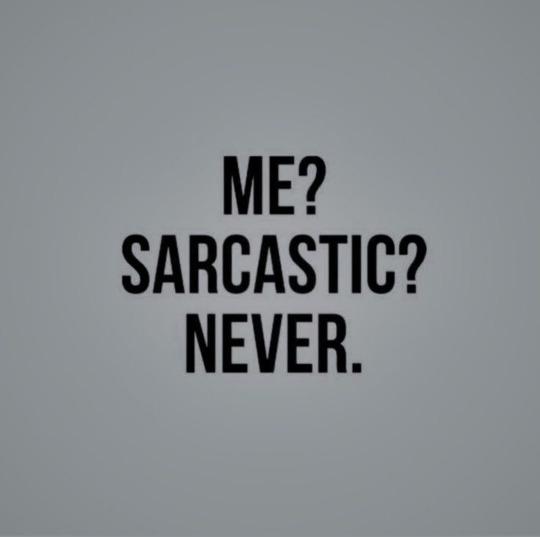
Name: Barty Crouch Jr. (Calling me ‘Bee’ is reserved for my friends)
sexuality: gay af
pronouns: he/him, they/them, basically anything but ‘she/her’
Age: 17
Likes: My friends, giving myself tattoos, smoking (my lungs are screwed), and black nail polish
dislikes: Gryffindors(with few exceptions), dads, school, the patriarchy, bigots, transphobes, + set schedules
People I know:
@signed-rab: Regulus (Reggie if he’s not in a mood), down bad for a Gryffindor (embarrassing)
@dor-c4s: Dorcas, says she’s the mum of the group, but she’s just as unhinged as the rest of us
@padfoot-the-dog: Sirius, Reggie’s sibling. Punk rock af
@jfprongsie: James, Reg’s Gryffindor boyfriend, pretty chill guy (also great at pranks)
@wormtail-on-a-string: Peter Pettigrew, skiddish little bloke, seems afraid of me
@m0ony-the-w0lf: Remus, one of the only respectable Gryffindors, lets me bum cigs off him sometimes
@my-name-is-lily-evans: Lily, don’t really talk to her much, but seems chill
@andromeda-chained-lady-black: Andromeda, Reggie’s cousin, always has great outfits
@faeries-rocks-books-spells: Xeno!!! Great guy, disappears for weeks sometimes tho. @pandas-roses: Pandora!!! Would marry her if I weren't gay and down bad for her brother.
Ooc: This is a rp blog, don’t like, don’t interact. main blog is @regulus0cantswim0black :)
27 notes
·
View notes
Text
well i was kinda busy blowing up my life a bit yesterday (stood my ground against the patriarchy and stopped being a shy girl for a moment) BUT BOOPING WOULD HAVE QUELLED MY TEARS
nonononononononononoooooooo UR NOT TELLING ME THAT I MISSED THE BOOPS omg no tell me this isn't trueee!!
#boop#boop o meter#tumblr boops#girlblogging#smash the patriarchy#girl why did 'patriarchy k!nk' come up when i tried to search for a patriarchy tag who likes the patriarchy??? it screws us all
4 notes
·
View notes
Text
Wow. So the “SAVE” Ace has passed the house and is on its way to the senate.
Please don’t let the name fool you. This would do anything but “save people”. If passed this would screw MANY low income voters, black and brown people and WOMEN ESPECIALLY.
Since this would require women to have the same last name they were born with. Now while this could get remedied with a passport keep in mind passports can cost over a hundred dollars.
Who wants to pay that much to vote??
These evil bastards know EXACTLY what they’re doing.
And when you remember that Project 2025 as well as Chipmunk Cheeks Vance has said they want “Household Voting” this is all a deliberate scheme for the patriarchy to return.
(Spoiler alert: the patriarchy SUCKS. Men can’t do anything without women and if women are ejected from the work place like Project 2025 wants; they want women working NO MORE than 20 hours a week, the economy would LITERALLY implode in on itself.)
In short, FUCK this administration and CALL YOUR REPRESENTATIVES!!!!
#anti donald trump#fuck donald trump#fuck trump#anti trump#anti maga#fuck maga#fuck republicans#fuck republikkkans#anti republican#us politics#politics#non anime#CALL AND HARASS YOUR REPS!!#if not….ladies it’s time to go on a pussy strike! 🤣
17 notes
·
View notes
Text
Princess Aerin Valleros
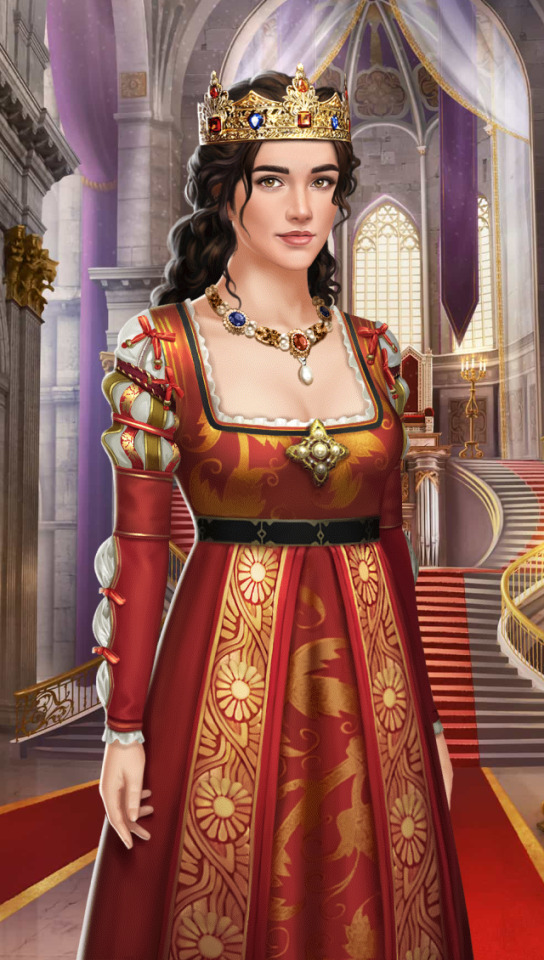
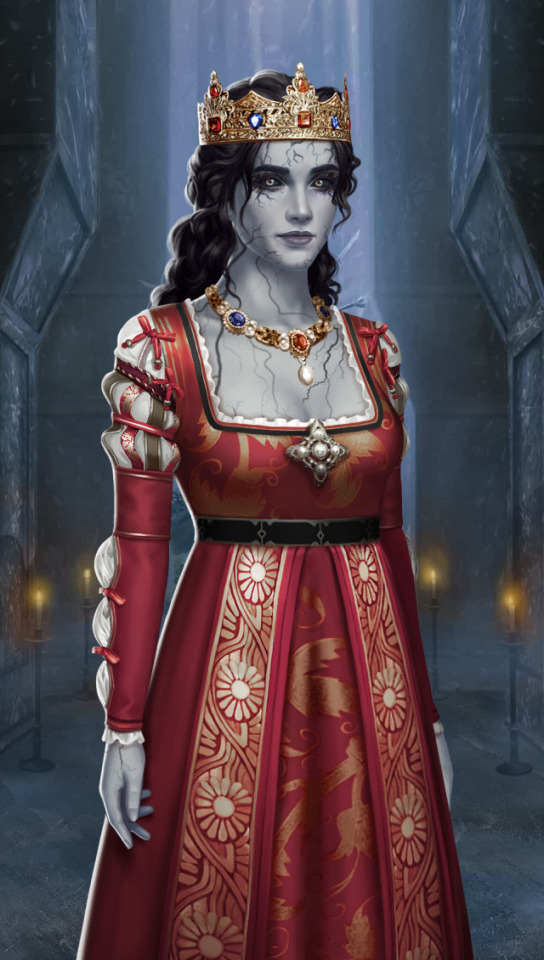
Someone has probably already done this before, but I saw @livelaughlovecassie's post about f!Aerin, and I was like. I have to.
And as I was making it, I grew more and more invested in the idea, because f!Aerin would be such problematic girlboss. Like, she was screwed over by the patriarchy, but she didn't give up and took matters into her own hands. I have no choice but to stan.
To further illustrate my vision:
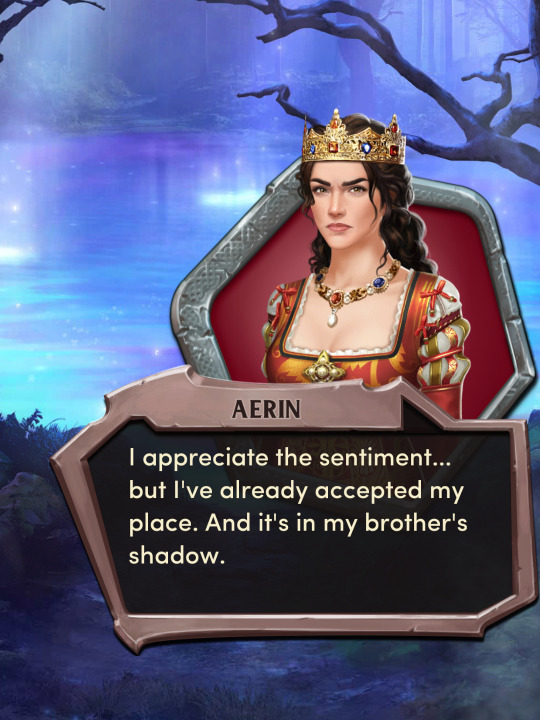
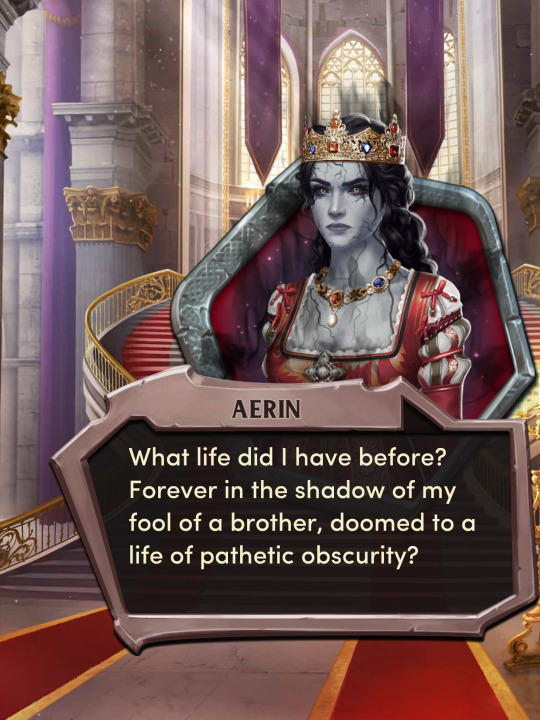
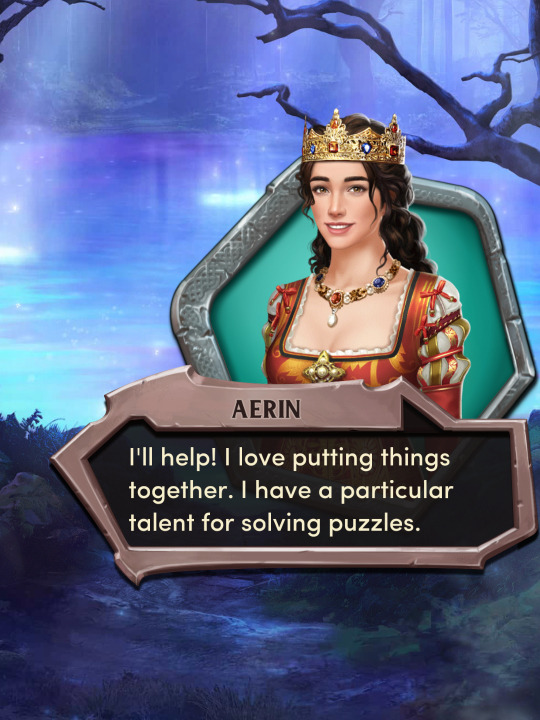
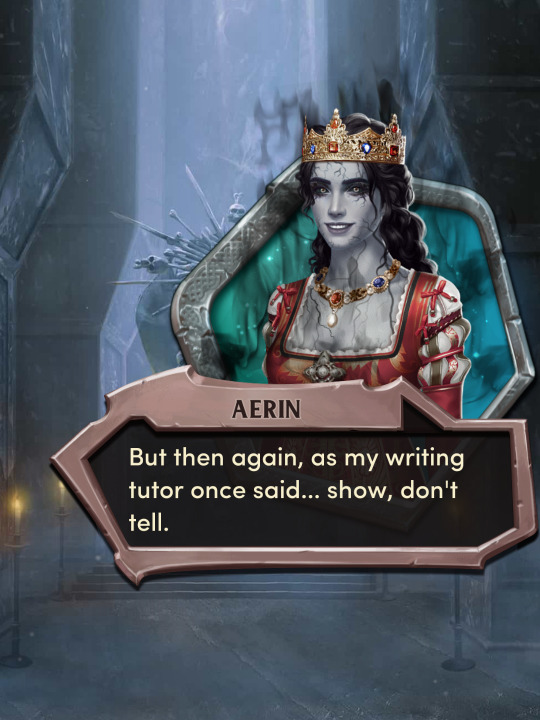
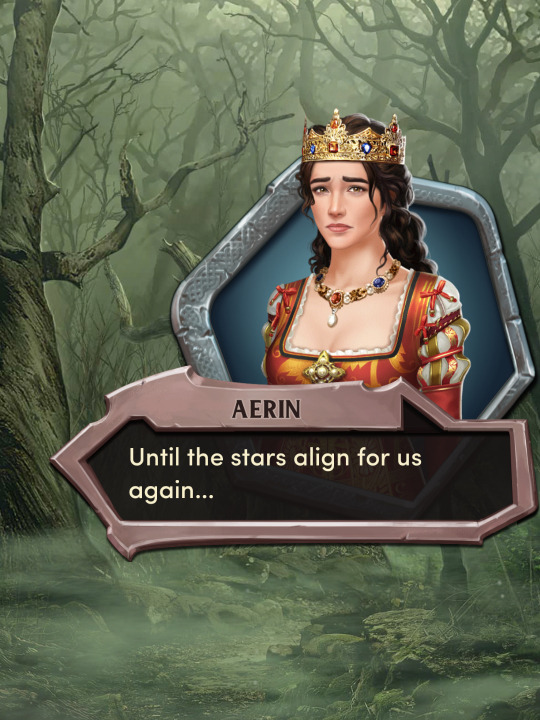
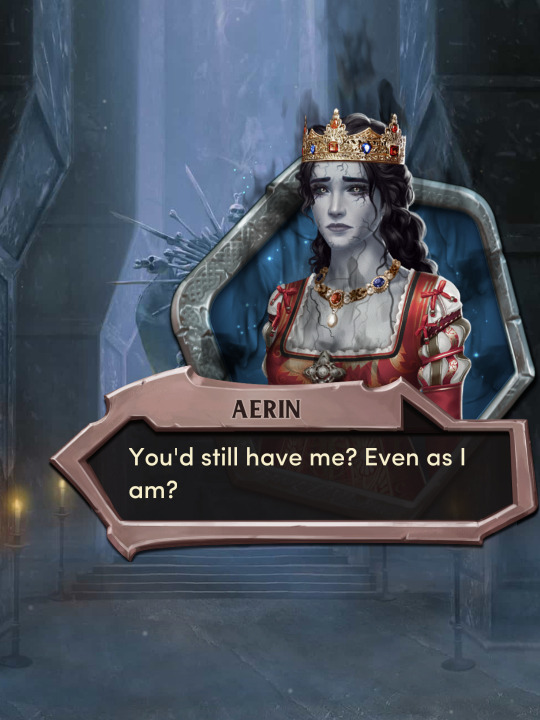
#to my lesbian followers who don't understand why i'm simping for this white toast of a man all over your dashes#hope this helps#god i now want an entire book about her#playchoices#choices edits#my edits#choices book club#blades of light and shadow#aerin valleros
223 notes
·
View notes
Text
My legs are also hairy rn bc I plan to wax them like 2 days before the wedding and ts is like a forest
Getting a pedicure makes me nervous bc not only are my toenails the most busted up disgusting shapes you’ve ever seen but also I’m super sensitive and the scrubber crap and nail files makes me 😖😵💫😵
#I feel so unwomanly#I mean like screw the patriarchy and also I’m genderfluid#but I’ve never really been a fan of leg hair period so#got that winter growth 🌳
12 notes
·
View notes
Note
My best friend's bf is a cis man and he's a sweetheart. I've been forced to change my own perspective because of him. (I was chronically online) But the point is, they really are not all bad.
thanks for taking the time to send an ask! i'm glad you have that person in your life. cis men are not inherently evil or shitty people, when we open our eyes to the caring, good, sensitive and supportive men in our environment, we begin to break down patriarchy. the belief that men are inherently violent, dangerous and oppressive upholds patriarchy and forces people to believe that men can never do better or be kind, that men can never be gentle, that men are inherently abusive, possessive and controlling. when we doom cis men to being irredeemable scum, it tells them they can never be anything than what they are currently, so why would they ever try to change? if we keep telling men that they are and basically HAVE to be bigots, we perpetuate the cycle of abuse and oppression at the hands of patriarchy.
"cis man" is not an inherently evil gender, much like any other person, cis men come in all shapes and forms. one of my old best friends was a cishet man who, when i came out to him as a trans guy, IMMEDIATELY switched to my new name and pronouns and never screwed them up not ONCE. he also never gave me shit for being bi/gay. he was very open minded, sure he wasn't perfect, but literally nobody is! out of all of my friends at the time, that guy had the least issues with my gender and sexuality. my friend at the time who was a cis woman struggled harder than he did.
thanks for taking the time to stop by and share your experience! i hope you have a great week
39 notes
·
View notes
Text
Noble Ladies and Warrior Women are all valid
Noble ladies are just as important, strong and intelligent as the warrior women who can physically fight. Margaery, Sansa, Catelyn and Alicent are just as powerful as Daenerys, Arya, Ygritte, Brienne and Asha.
The critiques of the noble ladies like Sansa are that “they’re too feminine,” “too weak” and “support patriarchy.” Sansa is the one who this is said about a lot, especially in the books. In no way is this a defense of Sansa and the other girls bullying Arya or the sexist, patriarchal society of Westeros but Sansa is a girl in her time.
She’s been raised that it is her role as a woman to be a homemaker, even so with the enforced/strict gender roles, Sansa enjoys being feminine or “traditionally feminine” or what people know as a “girly girl.” She has the right to like that stuff, the same way Arya has the right to want to become a knight; but within the medieval society of Westeros, Sansa is “right” in the sense that she’s following the rules while still being a lady and we can’t exactly put our 21st century logic onto the medieval society of Westeros.
Sansa was raised to be a lady and does what a lady is supposed to do, whether or not people feel she was indoctrinated into the idea of being a lady or it’s just her hobbies that she truly loves can be debated later, it’s who she is. In the books it’s said she was a “lady from birth” and that’s her character known for her perfectionist, ladylike style and attitude.
As a lady who will one day help her husband lead her own house she loves sewing, poetry, dancing, is very graceful, well-mannered, polite and loves wearing dresses. Her dresses and ideas of fashion change depending on which region and faction she’s in especially in the show, and sometimes in the books too. Her ideas of becoming a southron lady of the court and a princess as a child change dramatically after seeing her father being falsely accused of treason and executed and being held hostage. Reminder she’s a child whose ideas came from the fairy tales she was told as a girl, only to have her dreams shattered and forced to grow up.
She meets women like Margaery and Olenna, who do help her to escape. Margaery is the epitome of a southron noble lady. Her charm and altruism give her the support of both The Reach and the smallfolk; she uses her beauty and flattery to seduce someone as horrible as Joffrey to become the future queen.
Now some critics may say “that’s just using sex as a weapon” and yes that’s what Margaery knows she’s doing, she knows how to charm idiots like Joffrey who just see her as a “harmless, weak woman” when she’s not. Margaery was the one to go out and give food and toys to the orphans of Kings Landing during the war Joffrey started as a PR move, she knows Cersei needs the support of The Reach in these chaotic times for their food and their armies and needs their alliance or else the Lannisters are screwed and they lose the throne. Not just Joffrey losing the throne, but the Lannisters losing power.
Both Margaery and her grandmother are calculating and can read people like books. Olenna and Margaery knew that an evil little creep like Joffrey shouldn’t sit on the throne. Olenna and Margaery knew they were in danger as long as Joffrey lived and the war would continue; they didn’t just have him poisoned for the good of the realm, but for House Tyrell to get closer to the throne and having an easier sway with Tommen as king to control. House Tyrell gets to be in power, the war ends, Margaery stays safe as queen and the realm is stable and productive. It’s a win-win situation for everyone.
Sansa’s grace, patience and manners still remain even after she escapes Kings Landing and goes to The Vale with the help of Petyr Baelish; while disguising herself as “Alayne Stone” she still manages to keep her composure and patience while being cautious especially of the Vale lords like Harrold Hardyng. She needs to survive and wants to learn on how to lead her own house, but she has to be smart and use her head and not her fists. She’s not like Arya or Brienne, she doesn’t know how to fight or use a sword, it doesn’t make her “useless” or “stupid,” it’s knowing how to use your mind and your words in order to lead your people as the future lady of your house.
Being a lady doesn’t mean “raising your husband’s children and sitting in a castle looking pretty”, it also means to protect your lands, ensuring the safety of your people, commanding your borders and keeping peace between your house and others. There are many women in ASOIAF history who did have to rule their own house by themselves after the deaths of their lord husband, father or they didn’t marry at all like Jeyne Arryn, Danelle Lothston and Rohanne Webber, but more on them later. Sansa when disguised as “Alayne” learns of how to speak and to be tactful (while also lying) in the royal courts of The Vale by Baelish and how to rule when she can become Lady of Winterfell one day.
Another critique is that some people blame Catelyn for the way Sansa and Arya turned out. While Catelyn didn’t help Arya as much from Sansa’s bullying, it was also Ned who mostly told Arya that she had to be a lady and pushed more sexist ideas of gender roles onto her, him and Septa Mordane mostly are to blame for that. Catelyn could’ve done more to help Arya out too.
Catelyn as a lady is dutiful and honest, it was said even back then her father put her in charge of ruling over Riverrun while he had to leave the land a couple of times over his own son Edmure when they got older. She even wanted to do her duty to marry Brandon for the sake of her house before Robert’s Rebellion. When the war ended and she married Ned after Brandon’s death she did her duty and had her son Robb, while Ned brought back his bastard son Jon; it is rightfully seen as a betrayal to Catelyn granted none of this was Jon’s fault but it didn’t mean that Catelyn had the right to be worried that her husband’s bastard would take away her trueborn children’s inheritance, a fear that plagued many noble houses for centuries especially after the Dance of the Dragons.
Catelyn’s biggest duty and honor is her family and the continuation of their houses like any noblewoman wants. She is a strong woman, who seeks justice after she and Bran were almost murdered, she goes out with Ser Rodrick to get to Kings Landing and warn Ned, she has the guards of House Tully seize Tyrion. It was her idea for Robb to find an alliance with Renly Baratheon and has Brienne to become a knight in her service and stood up for her when she was accused of killing Renly.
Catelyn did have her moments of trying to isolate her children from their half brother Jon, her secretly going against Robb with her releasing Jaime and she didn’t like the idea of smallfolk entering Riverrun, but Catelyn’s heart stands for justice and truth especially when her family is being threatened and would do anything to get her daughters back and to protect them and her sons.
Speaking of protection, Catelyn grew up in Riverrun and her childhood sounds similar to Arya’s with her love of horse riding and making mud pies, she doesn’t sound “ladylike” or even “graceful” as a child like Sansa. A girl who loved adventures and playing games with her siblings, but had to grow up quickly as the older child, more so once the political unrest in Kings Landing began and Robert’s Rebellion started, with many lords and knights being accused of treason and killed. She most likely didn’t love Brandon or know him very well (he was the complete opposite of Ned) but she wanted to stand by her duties to her house and honor their commitments. Even when growing up and Petyr Baelish trying to fight for her hand even after she refused his advances and marriage proposal, she stood by her betrothal to Brandon and gave him her favor instead and thought of Petyr as foolish, which he was. Some might think it was cold or foolish for her to marry Brandon Stark, a man she didn’t know very well but she was right. The great houses needed to be aligned in the time of King Aerys becoming more unstable and unpredictable, the great houses knew they were all in danger if Aerys continued his reign of terror so they made alliances through marriage pacts in those terrifying times. Catelyn knew that the survival of her house and family came first and that there was no time for games. Her family’s reputation and wealth as her father was lord paramount to The Trident and House Tully was one of the most powerful in the Riverlands. If she and her family had to survive, she’d have to do her duty and honor her commitments to protecting her home, her house and her family. She was right to reject Petyr. A boy from a minor house who would risk her reputation and her honor. Unlike Lysa, Catelyn knew that she had the future to lead and set an example as a lady in a powerful house.
Even then, fear most likely took over Catelyn, not just with becoming a wife and mother in an entirely new region far from home during the Rebellion, but having her husband leave for war and never knowing if he was going to come back alive or even sane. Him bringing in a bastard child too increased that fear of being cast aside and her children disinherited. It was a sign of disrespect that Catelyn was right to be scared of. Catelyn was a lucky woman to have Ned Stark as a husband, many other women in noble houses aren’t. It wasn’t just her fears as a new wife and mother, but as a woman and hearing the evils that men are capable of towards women and children made her slightly paranoid most likely. Knowing what happened to Queen Helaena Targaryen and Princess Elia Martell and their children would have any woman, mother or not, lowborn or highborn terrified. Bastards rising against the land and usurping power from their trueborn siblings like in the Blackfyre Rebellion would have any lady fearing for the safety of their house and their children.
Don’t think that Catelyn not encouraging Arya to become a knight was out of hatred or cruelty, she loves Arya. She may have been confused as to why her daughter wanted to be a knight, but never hated Arya. She let both of her daughters go to Kings Landing, but never intended to see them hurt or knew a war would break out. Her not wanting Arya to stand out as a girl who wanted to be a knight, never came out of hatred but it was most likely fear. The fear that her daughter would end up being labeled as “mad” and then killed for it.
Women who went against tradition or who stood out/spoke up were killed. Women whether highborn or lowborn were the first targets when chaos and war broke out; women and girls becoming the targets for very horrible and despicable men, ending up as prisoners and slaves, systemic sexual violence being used to humiliate women. Many women who fought for power ended up killed like Rhaenyra Targaryen and “Mad” Danelle Lothston whose entire house became extinct. Catelyn doesn’t want Arya to end up like that, not just disgraced and thought of as “mad” but dead. To be seen as a threat in a very dark and unforgiving world as a woman.
Arya being allowed to do archery and playing sword fights with her brothers in Winterfell is safer, than having her going off outside of Winterfell and doing that. Home is safe, outside is not and from Catelyn’s perspective out there so far from home is dangerous.
It was never about “hating Arya” for not conforming to traditional gender roles, but about protecting her in these times in a patriarchal society.
There is something to be said about how Catelyn and her sister Lysa are fiercely protective of their children as mothers who are noblewomen, with Lysa being more extreme with coddling and enabling Sweetrobin like how Cersei does with Joffrey but that’s beside the point for later but it doesn’t mean the women don’t have the right to fear for the safety of their families and their houses.
Children of noble birth, highborn children are the future lines to their houses. Be that as it may they are granted far more protection and privileges than the children of the smallfolk. They are an extension of their family’s name in power, wealth and reputation; but it doesn’t mean they’re exempt from the horrors of the real world: there are many houses, many other nobles who’ve hurt children. They don’t care if you are a child, you will still meet the end of a blade. Babies have been ripped from their mothers arms and thrown against walls, thrown out of windows, poisoned or stabbed in front of their queen or lady mother’s eyes. Highborn children are not safe and there’s a special type of evil that comes with harming women and children of noble birth, it’s a form of humiliation and disrespect to the land and to the house itself.
While highborn boys are preferred and seen as the future heirs to their houses, girls have led their houses too but seen as valuable to bear said heirs. If a war breaks out, the firstborn son is at risk of being for being targeted. A boy and his brothers who will be lords and knights will see the horrors of war, their lord father being killed and their line becoming extinct. Girls and their mothers are at risk of being sexually abused. Either taken as prisoners of war or forced into a marriage pact both of which lead to rape. Highborn women are systemically targeted for sexual violence during the wars, this happens to lowborn women as well who have no political power whatsoever, it’s an “open secret” but more so open when highborn women are taken by lords of enemy factions. With what happened to many highborn ladies and princesses before her time and especially with Lyanna Stark being kidnapped and what happened to Princess Elia and her children, Catelyn is right in being terrified for her and her children.
Catelyn and Lysa have every right to be paranoid (to an extent) and while the regions they command as Lady of Winterfell and The Eyrie are powerful positions in very isolated lands whose elements and environments give them protection, there’s still danger beyond their lands. War can break out any moment whether due to the next king who can’t decide which of his heirs to name or some other usurpation happening. It’s happened time and time again, with many houses having to choose sides and sending armies. While Lysa isolates herself and Sweetrobin in The Eyrie on their mountains with their armies, Catelyn has the houses of The North and Riverlands and the wintry weather of The North to protect her somewhat. How long is the true question, or was.
The fear of losing your entire house and family is valid, especially as a noblewoman and as a lady mother. As a lady you and your children are supposed to stay there and be protected by your guards, even with having the money and resources to flee to another allied house, your land and people’s protection is still mandatory. A lady may have guards but she isn’t able to fight when the enemy army comes onto her family’s land.
Catelyn’s fears are valid especially after what history has shown what happened to Queen Helaena, Princess Elia, their children and not to mention what happened to the entire families of Houses Reyne and Tarbeck and the chaos during the Blackfyre Rebellion. Catelyn and Lysa had every reason to be afraid for their children and their houses. Lysa may have went too far by isolating herself and Sweetrobin in The Eyrie but she was smart in her own way about it and not wanting her people involved in a war against the other kingdoms (she had her own lies and reasons but still) and Catelyn finding alliances within The North and The Riverlands so Robb could become King and be protected was valid. It might’ve been fear, but both women were right in protecting their sons in their own ways in anyway they could.
Another ASOIAF noblewoman who is seen as “dumb” for being “too feminine” is Alicent Hightower, but given because she is a villain. In the books she’s just seen as an “evil stepmother trope” who is jealous of her stepdaughter Rhaenyra, is mean, insults her weight and calls her a “whore.” Just a one dimensional villain which is fine. Villains will be villains. Now in the show Alicent’s age is changed to be a teenager just like Rhaenyra, and given the backstory that she’s a childhood friend who grows up in court with Rhaenyra. Show Alicent is timid, nervous and soft spoken but loves to read, a very educated lady. A sweet girl who like many other noble ladies like Catelyn and Sansa, are forced to grow up and eventually marries Viserys.
Now due to the patriarchal settings and being manipulated by her father Otto, she becomes more alone especially after being married and pregnant so young and feeling lied to and betrayed by Rhaenyra, Alicent starts to rely on her own House Hightower and their allies for support as “The Greens” against “The Blacks.” Of course Alicent can’t fight or wield swords, but again as a queen she has her court and the alliances with her family’s house to protect her. Using her mind and power as a noblewoman who can command guards and an army. Some might say it was deranged, and Alicent becoming paranoid but in a way as a queen she is right to be afraid for her and her children’s safety.
The scene of Alicent coming to the wedding in her new green dress was a smart power move. No it wasn’t “insignificant” it was powerful to call forth the allies of the Hightowers to protect her, her house and family as a political war was starting. Alicent would have the Reach houses, the houses of the Westerlands and the members of the Faith behind her. With the Queen’s Party of The Greens together to stand for honor, duty and tradition was powerful. The change to the green dress at the wedding instead of a tourney was more impactful.
This isn’t to say that these women who are traditionally feminine are “better than” the women who aren’t in the stories. They do make mistakes and are flawed and that’s what makes them human. Arya and Sansa are still kids who are still trying to find themselves as they grow up in noble houses and experiencing the traumatic power mad adults around them. Catelyn does support Robb becoming King in the North but doesn’t listen to his rules and goes behind his back a couple of times not following his orders; her descent into becoming Lady Stoneheart is tragic and her world darken after thinking all of her children are lost. Alicent (at least the book version) and her own greed, lies and paranoia caused the deaths of thousands with a war. Show Alicent was a child who was groomed and abused and forced to be a queen.
A big problem with the show versions is that the internalized misogyny some of the characters have towards more traditionally feminine women, with thinking that somehow it’s related to being “weak” and “stupid.” Arya’s dumb line of “some girls are stupid” was gross and Rhaenyra saying "they must see me a ruler, and the symbols of authority are not jewels and gowns but the shield and the sword" which is ridiculous because in the books Rhaenyra was known for wearing tons of jewelry, loving her luxury as a princess and was known as “The Realm’s Delight” and considered one of the most beautiful women in Westeros, that wasn’t right. Condal saying that Sansa being sexually assaulted “made her stronger” and her line of being a “little bird” when meeting Sandor again in Winterfell was awful.
Being traditionally feminine isn’t “stupid” or “weak,” the noble ladies we see are their own people and are just as strong and intelligent as the women who are knights and warriors. They can’t just “beat” and “cut” the patriarchy, you have to think and plan while ruling and you can look beautiful at the same time while doing it. Not for men, but for themselves and to live as women in peace. Being a lady means being a leader.
#game of thrones#asoiaf#housetargaryen#house hightower#house stark#queen rhaenyra#grrm#hotd spoilers#westeros#got spoilers#house tyrell#house tully
19 notes
·
View notes